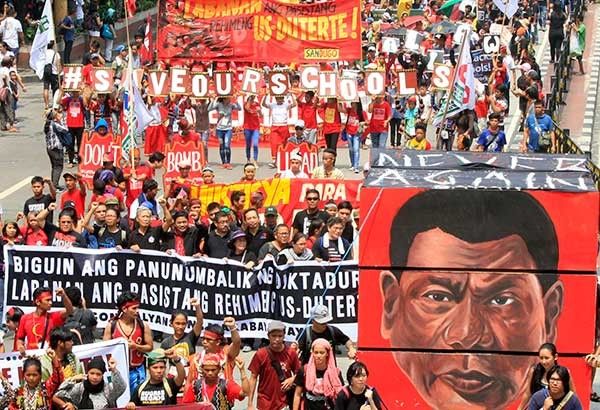The process of charter change, explained

MANILA, Philippines — The charter change train is chugging once again, with allies of President Rodrigo Duterte in Congress making moves to restart discussions on changing the fundamental law of the land.
It is no secret that Duterte wants to change the Constitution for the longest time, even including charter change, colloquially known as cha-cha, in his platform when he ran for president in 2016.
From pronouncements of his congressional allies, it is clear that Duterte is still not giving up on his cha-cha dreams, with him having nudged Congress leaders to convene into a constituent assembly to amend “restrictive” economic provisions in the Constitution and even change the party-list system.
But what is charter change, anyway? And why should we care about the whole process?
What is charter change?
Charter change, simply, is the process of introducing amendments or revisions to the Constitution.
Amendments, as explained by constitutional law professor Tony La Viña to Philstar.com, are small changes to the Charter like changing the minimum age of those qualified to run for president from 40 to 25. Revisions are larger changes to the Constitution, like shifting from a presidential form of government to a parliamentary one.
Amendments or revisions to the Constitution may be proposed through a constituent assembly or a constitutional convention.
Congress itself forms a constituent assembly, where lawmakers can propose amendments or revisions to the Constitution which would pass upon a three-fourths vote of all its members. It is not clear, however, if the House of Representatives and the Senate should vote separately or jointly (more on this later).
On the other hand, a constitutional convention is a separate body, composed of elected representatives, created solely to propose amendments or revisions to the Charter.
Congress can call for a constitutional convention upon a two-thirds vote of all its members. A majority in Congress can also call for a referendum on whether a constitutional convention should be convened.
Citizens themselves can propose amendments to the Constitution through a people’s initiative. For this to happen, there should be a petition by 12% of all registered voters in the country. All legislative districts must be represented in the petition by 3% of all registered voters there.
All proposals to amend or revise the Constitution would be approved or rejected by the people in an election known as a plebiscite.
What is the best method?
All three methods have their pros and cons, but experts Philstar.com spoke to prefer changing the Constitution through a constitutional convention.
“The Constitution is so important that it should be drafted by a body that’s dedicated to doing it.” La Viña said, remarking that a constitutional convention is more democratic.
For political science professor Jean Franco, creating a constitutional convention allows people to be more aware and educated of the process of changing the Constitution.
The downside to a constitutional convention is that it can be expensive, with the country having to hold polls to elect new representatives and having to fund the cost of running the whole convention.
A cheaper alternative would be a constituent assembly, but the drawback here, Franco said, is that the legitimacy of the process can be tainted.
“How can you entrust them (Congress) with something that will affect them? They are not a disinterested party … especially to the political changes that they are going to propose,” she said partly in Filipino.
For La Viña, a constituent assembly would split lawmakers’ time and focus between their regular duties in Congress and their new task of proposing amendments or revisions to the Constitution.
But what about a people’s initiative?
“It’s quite complicated,” La Viña said. “It doesn’t work at all, really, at this time.”
Should Congress vote jointly or separately?
As mentioned earlier, Congress can pass changes to the Charter by a three-fourths vote of all its members, but the Constitution is not clear whether the House or the Senate should vote jointly or separately.
The issue has been a persistent thorn on the side of charter change talks, with the Senate always insisting that voting should be done separately as voting jointly would mean that the chamber, composed of only 24 members, would be easily overpowered by the House, currently composed of 307 members.
In La Viña’s opinion, the two houses should vote separately. “Congress always votes separately, unless specifically provided by the Constitution that they have to vote jointly,” he said.
But ultimately, he said, the issue of whether the House or the Senate should vote jointly or separately would be up to the Supreme Court to decide.
Can charter change discussions be limited to only certain provisions?
Proponents of the renewed push for charter change say that they would only be tinkering with certain provisions of the Constitution, particularly those that limit foreign ownership of lands, public utilities, educational institutions and mass media.
But Franco and La Viña both said that any changes can be made to the Constitution once it is opened up for amendments or revisions.
“Nobody can limit whatever changes people can propose,” La Viña said.
This is the fear of some lawmakers that charter change will be used to extend the terms of politicians and even ease or completely lift the limits on their terms.
Why should we pay attention?
Changes to the Constitution affect everyone and can have long-term implications to the way how our government works.
Franco said it is important to pay attention to the process of charter change to ensure that the changes which will be introduced to the Constitution would benefit everyone.
“We must ensure that it would result in a political system that’s more inclusive to disadvantaged sectors and we must ensure that politicians are better held accountable in case they have transgressions or in case they abuse their powers,” she said.
But both Franco and La Viña said it is not the right time to change the Constitution as the pandemic still rages and the havoc it wreaked on our society has yet to be properly addressed.
“Look at our politicians, they are not focusing on the worst problems we have at the moment,” she said.
“There is no urgency for all the economic provisions, given the world is in recession and there’s little trade going on in the world,” La Viña said. “This is about extending the term of President Duterte and the senators and the congressmen. That’s very clear too. So you have to pay attention to stop it.”
- Latest
- Trending

































